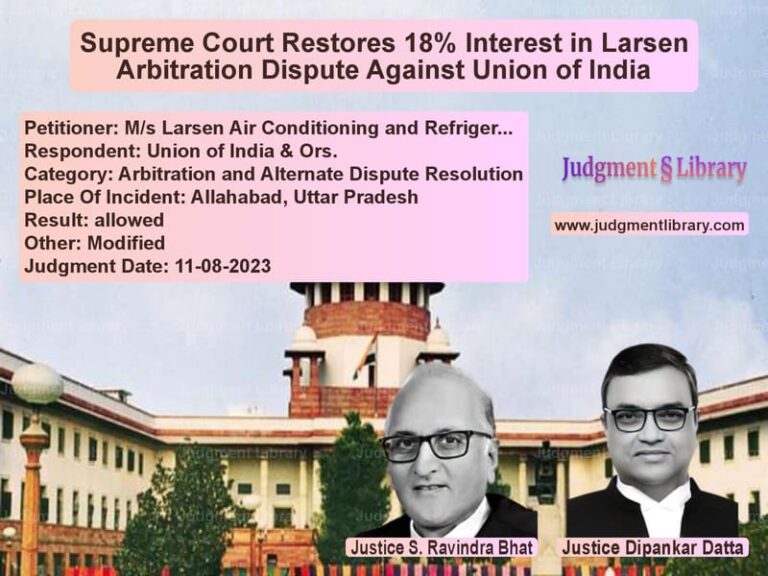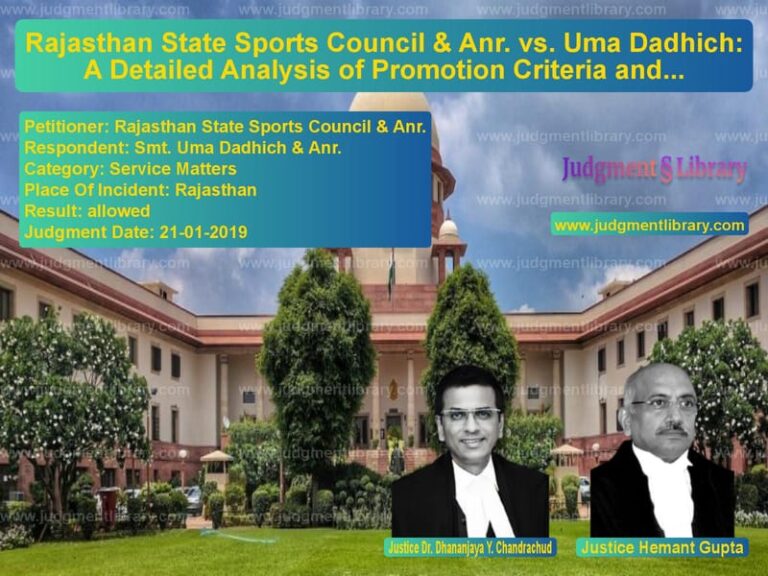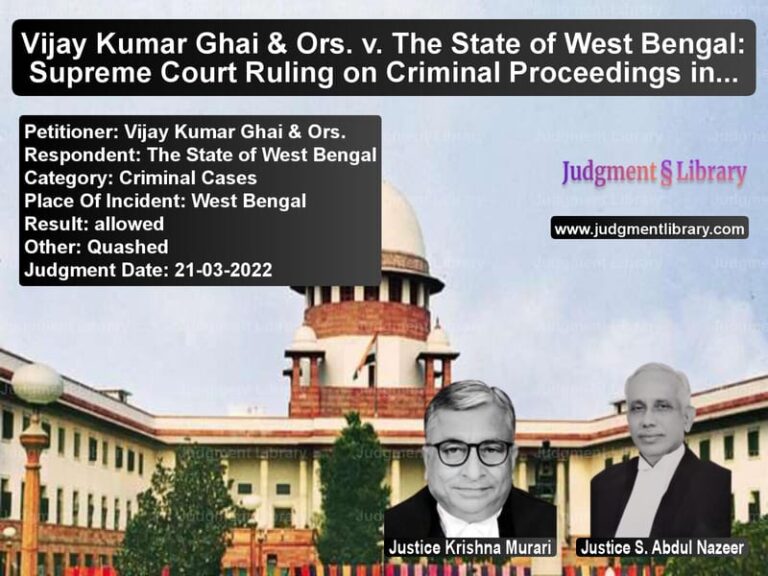Granting of Anticipatory Bail in Talaq Case: Supreme Court’s Ruling on Personal Liberty
This case arises from an appeal concerning the denial of anticipatory bail to Rahna Jalal, the appellant, in connection with allegations under the Muslim Women (Protection of Rights on Marriage) Act, 2019, and the Indian Penal Code. The appellant, who is the mother-in-law of the second respondent, was implicated in a case where her son allegedly pronounced triple talaq on his wife. The appellant sought anticipatory bail under Section 438 of the Criminal Procedure Code (CrPC), which was initially denied by the Kerala High Court.
Background of the Case
The marriage between the second respondent (the wife) and the appellant’s son was solemnized on May 14, 2016. The couple had a child born in May 2017. On August 27, 2020, the second respondent filed an FIR against the appellant’s son and others, accusing them of offenses under Section 498-A of the IPC, Section 34 of the IPC, and the Muslim Women (Protection of Rights on Marriage) Act, 2019. The complaint alleged that on December 5, 2019, the appellant’s son pronounced triple talaq on his wife, and soon after, entered into a second marriage.
The appellant filed for anticipatory bail under Section 438 of the CrPC, which was rejected by the High Court of Kerala. The appellant appealed to the Supreme Court, questioning whether the High Court was justified in denying anticipatory bail, particularly in light of the legal provisions under the Muslim Women (Protection of Rights on Marriage) Act.
Petitioner’s Arguments
The petitioner presented the following arguments:
- Legal Status of the Appellant: The petitioner argued that as the mother-in-law of the second respondent’s husband, she could not be charged under the provisions of the Muslim Women (Protection of Rights on Marriage) Act, 2019. This Act specifically applies to the Muslim husband who pronounces talaq, and not to the appellant, who is a third party in the marital relationship.
- Section 7(c) of the Act and Anticipatory Bail: The petitioner contended that Section 7(c) of the Act, which imposes conditions for granting bail, does not bar the exercise of anticipatory bail under Section 438 of the CrPC. The appellant argued that Section 7(c) only requires the court to hear the married Muslim woman upon whom talaq is pronounced before granting bail, and it does not bar anticipatory bail altogether.
- Lack of Substance in the Allegations: The appellant further pointed out that the FIR lacked detailed and specific allegations against her, particularly with regard to her direct involvement in the pronouncement of talaq. The petitioner emphasized that the High Court had not provided adequate reasoning for denying anticipatory bail.
Respondent’s Arguments
The respondents, particularly the second respondent (wife) and the State of Kerala, presented the following counterarguments:
- Applicability of the Muslim Women (Protection of Rights on Marriage) Act: The respondents argued that the appellant’s actions, being related to the family dynamics in a case of triple talaq, should be considered under the provisions of the Muslim Women (Protection of Rights on Marriage) Act, 2019. The respondents asserted that the appellant’s role as a member of the family could make her complicit in the violation of the law.
- Need for Judicial Oversight: The respondents emphasized that the court must exercise caution in granting anticipatory bail in cases related to serious allegations, particularly those involving the violation of women’s rights under the Muslim Women (Protection of Rights on Marriage) Act.
Supreme Court’s Analysis
The Supreme Court carefully analyzed the submissions of both the petitioner and the respondents. Key points of analysis included:
- Interpretation of Section 7(c) of the Act: The Court examined the text of Section 7(c) of the Muslim Women (Protection of Rights on Marriage) Act, 2019. The Court concluded that while Section 7(c) imposes a requirement for hearing the married Muslim woman before granting bail, it does not categorically bar anticipatory bail under Section 438 of the CrPC. The Court noted that the non-obstante clause in Section 7(c) operates only to the extent that it mandates a hearing, not to deny bail altogether.
- Scope of Section 438 CrPC: The Court recognized that anticipatory bail is a safeguard against arbitrary detention, and the power of judicial discretion to grant anticipatory bail is a fundamental part of personal liberty. The Court referred to earlier decisions, such as Hema Mishra v. State of U.P., affirming that courts have the authority to grant anticipatory bail even when there is a statutory bar, provided there are reasonable grounds for doing so.
- Role of the Appellant: The Court noted that the appellant was not directly involved in the pronouncement of talaq. The Court highlighted that the law under the Muslim Women (Protection of Rights on Marriage) Act, 2019, is specifically aimed at the Muslim husband who pronounces talaq, and not at third parties like the appellant.
Supreme Court’s Judgment
The Supreme Court allowed the appeal and granted anticipatory bail to the appellant, observing:
“The appellant, as the mother-in-law of the second respondent, cannot be accused under the Muslim Women (Protection of Rights on Marriage) Act for the pronouncement of talaq, as the offense is committed by the Muslim husband.”
The Court further stated:
“There is no statutory bar against the grant of anticipatory bail under Section 438 of the CrPC. Section 7(c) of the Act only requires that the married Muslim woman be heard before bail is granted, but does not bar anticipatory bail.”
The Court concluded by granting the appellant anticipatory bail, subject to the condition that she cooperate with the investigation and attend all required hearings. The appellant was directed to file a personal bond of Rs. 25,000 and be released on bail if arrested.
Conclusion
The Supreme Court’s ruling in this case highlights the balance between personal liberty and the need for judicial oversight in cases involving sensitive issues like the pronouncement of talaq. The decision underscores the importance of interpreting statutory provisions harmoniously and emphasizes that the right to anticipatory bail is a fundamental safeguard against arbitrary detention, even in cases involving specific legislative frameworks such as the Muslim Women (Protection of Rights on Marriage) Act, 2019.
Petitioner Name: Rahna Jalal.Respondent Name: State of Kerala and Another.Judgment By: Justice Dhananjaya Y Chandrachud, Justice Indu Malhotra, Justice Indira Banerjee.Place Of Incident: Kerala.Judgment Date: 17-12-2020.
Don’t miss out on the full details! Download the complete judgment in PDF format below and gain valuable insights instantly!
Download Judgment: Rahna Jalal vs State of Kerala and Supreme Court of India Judgment Dated 17-12-2020.pdf
Direct Downlaod Judgment: Direct downlaod this Judgment
See all petitions in Bail and Anticipatory Bail
See all petitions in Domestic Violence
See all petitions in SC/ST Act Case
See all petitions in Judgment by Dhananjaya Y Chandrachud
See all petitions in Judgment by Indu Malhotra
See all petitions in Judgment by Indira Banerjee
See all petitions in allowed
See all petitions in supreme court of India judgments December 2020
See all petitions in 2020 judgments
See all posts in Criminal Cases Category
See all allowed petitions in Criminal Cases Category
See all Dismissed petitions in Criminal Cases Category
See all partially allowed petitions in Criminal Cases Category







